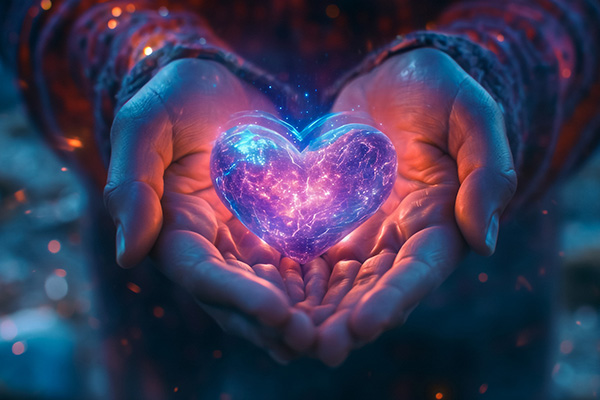self-forgiveness
Your Sacred Center Of Self-Love
 We all thrive on being loved. This is natural, of course, if you look back at humanity in history on an evolutionary level. Ancient people came together in tribes, families, and groups, to cultivate a place of safety, security, nurturance, and love.
We all thrive on being loved. This is natural, of course, if you look back at humanity in history on an evolutionary level. Ancient people came together in tribes, families, and groups, to cultivate a place of safety, security, nurturance, and love.
If you were different or stood out in any way, or even left the tribe, you were literally putting your own life at risk. This topic can be viewed from so many arenas, including psychological, spiritual, scientific, and psychic.
I often wonder how and when did we start defining ourselves by how others felt about us, and why did we believe that other’s thoughts about us were true? At what point in time did we allow others to define us? It’s as though we as humanity went into a deep trance.
We all know the phrase, “Love thyself first”. When did we forget this vital piece of information?
There are many ways we can come back in touch with this essential truth, but for the most part, our society does not support a lifestyle that would naturally lead us back to our sacred center of self-love.
How often do you take a moment to look in the mirror, or tell yourself, “I love you?” Most of us feel silly doing this, but it is very healing.
Have you ever met an older person who behaves in ways that are foolish or who just doesn’t give a hoot what anyone else thinks? My paternal grandfather used to throw dinner rolls across the table at me in fancy restaurants. While my parents and other family seated at the table would roll their eyes at my Grampy, I used to laugh hysterically!
Feeling Stuck? Maybe It’s Time To Clear The Clutter!
 Have you ever felt like your life is stagnant…or even moving backwards. Despite your best intentions and efforts, something unseen keeps slowing your down or pulling you off track?
Have you ever felt like your life is stagnant…or even moving backwards. Despite your best intentions and efforts, something unseen keeps slowing your down or pulling you off track?
Recently, I found myself in exactly that place. My energy was low. My motivation had all but evaporated. My health was taking a hit.
And even though I was doing all the “right” things-helping others, staying aligned with my purpose, and working toward my highest good-everything felt dense, heavy, blocked, stuck.
In a quiet moment of surrender, I finally sat down and asked my guides, “What am I missing here?
The answer I received was very simple, yet profoundly eye-opening:
“It’s time to clear the clutter…so you can move forward.”
At first I was stunned. What? Really? But after some careful reflection, the wisdom of this guidance from spirit sunk in.
The idea of clutter is one we often associate with messy rooms, crowded surfaces, or overflowing closets, but its reach goes much deeper.
Clutter can accumulate in our minds, emotions, energy fields, and souls. It’s not always visible, but it weighs us down. It can block intuition, dull our spark, and create invisible walls that keep us from stepping into our divine potential.
The Divine Path Back To Unconditional Love
 Recently, I was meditating on a deeply personal situation — one that stirred up waves of anger and resentment, even bordering on hatred and bitterness. Then I received an insight from spirit that stopped me in my tracks. It was one of those profound moments when time stands still and sacred truth illuminates your heart.
Recently, I was meditating on a deeply personal situation — one that stirred up waves of anger and resentment, even bordering on hatred and bitterness. Then I received an insight from spirit that stopped me in my tracks. It was one of those profound moments when time stands still and sacred truth illuminates your heart.
“Never forget the Golden Rule,” spirit said. “Do unto others as you would have them do unto you. Do not do to others what you do not want done to you. Do unto others as you would have them do unto you.”
Suddenly I realized that the deeper truth of holding unconditional love in your heart. It’s a universal spiritual principle because it works both ways! You would never, ever want the same hatred or anger that you direct at others, to be directed at you.
Now let me be honest. My anger this time wasn’t just outward to others. It also turned inward. It was a growing dark, toxic presence in my heart and mind.
Life has been hard lately. Too many people I know have died far too young. Watching my beloved partner in a so-called “medical facility” that should not be allowed to take care of anyone, especially our elders. Almost losing him. Being emotionally and financially drained by someone I trusted. The exhausting noise of political chaos.
It has been one thing after another, piling up until I reached a boiling point. I began to ask the big, painful question: Why? Why all this suffering? Why now? Why me? And I wasn’t just angry at the world — I was angry at myself. Angry at Source, Spirit, God. Angry at the seeming cruelty of it all.
Coping With The Loss Of A Loved One
 The loss of a loved one is one of the most profound and challenging experiences we can have. Even if we have a deep spiritual belief that our loved one has crossed over into the spirit realm free of pain and suffering, the grief of their physical absence remains.
The loss of a loved one is one of the most profound and challenging experiences we can have. Even if we have a deep spiritual belief that our loved one has crossed over into the spirit realm free of pain and suffering, the grief of their physical absence remains.
It is natural to mourn their departure, to feel the sting of their absence in our daily lives, and to struggle with the reality of a world that feels less complete without them.
For those who have lost a parent, this grief can bring an added layer of vulnerability. Regardless of our age, the loss of a mother or father can leave us feeling untethered, with a foundation in life that once provided security and guidance now shaken. Even if we have spent years caring for them through illness or decline, their passing can still leave us feeling profoundly alone.
This transition marks a significant shift, not only in our outer reality, but also in our inner identity. And yet, in the depths of grief, there is an opportunity for deep reflection, gratitude, and connection.
One of the most powerful ways to navigate grief is to focus on gratitude for the connection you shared with your loved one. Their love, wisdom, and presence shaped you in countless ways, and that influence does not disappear with their passing. Celebrate their life with vigor. Share their stories, embrace cherished memories, and allow their laughter to echo through your heart.
The Cautionary Tale Of The Lovestruck Witch
 Once upon a time, there was a goodly witch named Wanda. Though she sometimes had a fiery temper, her heart was generally in the right place.
Once upon a time, there was a goodly witch named Wanda. Though she sometimes had a fiery temper, her heart was generally in the right place.
For many years, Wanda lived a cozy life with her partner, Colwyn the Brave, in a happy and fulfilling relationship.
But one day, out of the blue, Colwyn announced that he was ending the relationship. Although he still loved Wanda, he explained that he no longer had the romantic or emotional feelings necessary to sustain the relationship.
But Wanda was no fool. Fee-fi-fo-fum, she knew by the prick of her thumb…that he was lying through his teeth! The truth was that he had decided to dump her for her so-called best friend, Suvanna the Enchantress.
Wanda was devastated. She had dedicated more than two decades of her life to this man, standing by him through thick and thin. And her friend’s betrayal only added further insult to injury.
Realizing the extent of the pain he had caused, Colwyn tried to comfort Wanda, assuring her that one day she would meet someone who would make her much happier than he ever had.
But his words fell on deaf ears. Wanda was heartbroken and very, very angry.
Then she remembered…she was a witch. She could make things happen, especially with the help of her sisterhood of witches.
New Year, New Habits, And A New You!
 Many people make resolutions every year that are never kept. They make a sincere effort for a month or so, and then it just slips here and there until whatever they decided to do just falls by the wayside. This is normal, and you should never beat yourself up if you make a resolution or promise and don’t follow through. Growth is a process, not a straight line.
Many people make resolutions every year that are never kept. They make a sincere effort for a month or so, and then it just slips here and there until whatever they decided to do just falls by the wayside. This is normal, and you should never beat yourself up if you make a resolution or promise and don’t follow through. Growth is a process, not a straight line.
When I decide to do something, the first thing I do is meditate on it. I ask my guides and angels, “Is this right for me? Will this improve my life? If I don’t do this, will it hurt me or someone else? If the answers are yes, yes, and no, then I know it’s the right thing for me to do.
I do not reserve this for New Year’s resolutions. I do this throughout the year whenever I feel spiritual growth within myself or experience something that sparks change, whether positive or negative. A new year can begin any day you decide to change some aspect of your life. It doesn’t have to be January 1st; it can be any day.
Personally, I make a new “resolution” each month. At the end of each month, I reflect and ask myself if I’ve accomplished what I set out to do. If not, I set it aside and move on to something new. Eventually, I return to the unfulfilled goal, knowing that the timing wasn’t right. I don’t beat myself up about unfinished goals; instead, I send them love and leave them for later.
My most important resolution is to get closer to Spirit. I strive to understand what Spirit has in store for me and to guide me to become the best version of myself from the inside out. The outward appearance can be dressed up or down, but the true self must be healed, clear, and joyful. That joy doesn’t come from another person or thing – it comes from loving myself as it should be for you. Love yourself as you are in this moment, and nurture the new version of yourself with daily love, meditation, and surrender to your higher self.
Forgiving Yourself Is A Spiritual Necessity
 Self-forgiveness is more than just a mental health recommendation – it is a spiritual necessity. It is vital for the spiritually aware person to release guilt, self-blame, and self-criticism, because forgiving oneself is crucial to both personal well-being and spiritual progress. It allows for healing, growth, and the ability to live a more fulfilling and harmonious life.
Self-forgiveness is more than just a mental health recommendation – it is a spiritual necessity. It is vital for the spiritually aware person to release guilt, self-blame, and self-criticism, because forgiving oneself is crucial to both personal well-being and spiritual progress. It allows for healing, growth, and the ability to live a more fulfilling and harmonious life.
Failure to forgive ourselves can have profound personal and spiritual side effects. Carrying guilt and self-blame leads to chronic emotional distress and contributes to anxiety, depression, and low self-esteem. Over time, this can manifest itself in physical symptoms such as headaches, fatigue, or even chronic illness.
A lack of self-forgiveness undermines self-worth and hinders personal growth and development. Difficulty forgiving yourself also strains your relationships with others, as it can lead to withdrawal, defensiveness, or projecting negativity onto those around you. Without forgiveness, our negative feelings toward ourselves can fester and damage even our most cherished relationships with our loved ones and friends.
Holding onto guilt and self-blame blocks the flow of positive energy through the chakras and hinders spiritual well-being. For example, guilt often stagnates in the solar plexus chakra, affecting one’s sense of personal power. Self-forgiveness is essential for clearing such blockages in the energy field.
Forgiveness is also essential to achieving inner peace and harmony. Without it, one can experience constant inner turmoil and restlessness. When we hold onto guilt, shame, or self-blame, parts of our spiritual essence or inner divinity are suppressed or disconnected. It causes separation from one’s spiritual path or a sense of disconnection from spirit and the divine.